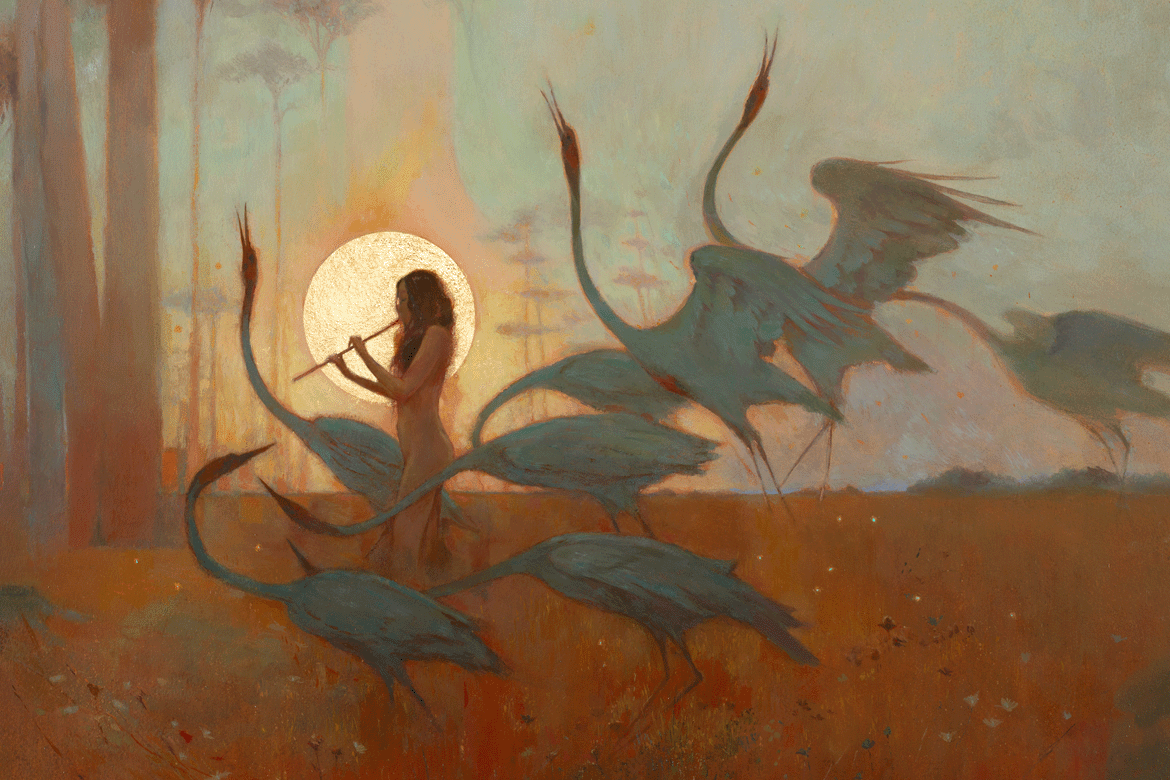“Dans le tumulte de la nuit.“
Alcest’s mastermind (the French multi-instrumentalist Neige) and Enya are supposedly different people. What if they aren’t? It’s actually very difficult to prove a negative. I mean, have you ever seen them in the same room at the same time? I thought not. (Please get in touch if you have.)
Alcest’s first two albums, 2007’s Souvenirs d’un autre monde and 2010’s Écailles de lune, helped pioneer the blackgaze genre (and were coincidentally – allegedly coincidentally – released during a lull in Enya’s career). While blackgaze is supposedly just black metal combined with shoegaze, Alcest combine this with a fantastical, dreamlike aesthetic that is closer to the wistful celtic music of Enya than anything you might have heard from Darkthrone and friends. If you’re an Alcest fan who has never listened to Enya on principle, I dare you to hold your nose, listen to “Shepherd Moons” and tell me I don’t have a point. And if you’re familiar with Enya but not Alcest, put on “Tir nan og” and be ready for at least one of your eyebrows to rise.
If I sound a little more excited than usual, then it’s probably because I have been listening to Alcest’s new album, Les chants de l’aurore. And enjoying it. A lot. Which, if I’m honest, I wasn’t expecting. Alcest’s first two pioneering albums were followed by two albums of decline: 2012’s Les voyages de l’âme felt like a band treading water, while I’ve always viewed 2014’s Shelter as a failed, if valiant, experiment. These were followed by two stronger albums, 2016’s Kodama and 2019’s Spiritual Instinct, that steadied the ship by riffing on Écailles de lune’s winning formula. Les chants de l’aurore, their seventh album, is the product of a band that has been going for over twenty years. It’s very easy to approach this album with cynicism: after all, how many other bands are full of fresh ideas after going for this length of time?
Les chants de l’aurore is distinctly Alcest-esque: the waltzing guitar riffs, the elven vocals and the irresistible fantastical charm are all in place. Compared to Kodama and Spiritual Instinct, the metal elements of Alcest’s palette are not quite as front-and-centre on this album. What’s new on Les chants de l’aurore is the unbridled jubilation. The songs are bursting at the seams with soaring joy. This is clearest on the album’s opener, “Komorebi”, and the two singles, “L’Envol” and “Flamme Jumelle”. These tracks are really happy – even by Alcest’s standards – but also energetic, bombastic and euphoric. Alcest have also had an awful lot of fun with the outros of these songs: “Komorebi” and “L’Envol” have luscious synth outros, exactly the kind of thing you might imagine Enya doing.
The album is not without its flaws. “Améthyste” and “L’Enfant de la Lune” both feel like Alcest on autopilot. What I found most disappointing was that “L’Enfant de la Lune” started with this great building introduction that almost had hints of trance music about it. Before the ideas in the intro can properly develop, the song abruptly changes into something Alcest fans will have heard countless times before. It felt like the band had an opportunity to try something exciting and different but bottled it at the last minute.
We also have a couple of gentler tracks on Les chants de l’aurore. “Reminiscence” is a short, gentle piano piece embellished by Neige’s layered vocals. And the album closes with a stunningly beautiful ballad. Its melancholia is in stark contrast to the rest of the album. Listening to this album is a remarkably affecting experience: I don’t think I have been this moved by an Alcest album since Écailles de lune, this is only heightened by the closing track’s poignant title: “L’Adieu”. I really hope that this album isn’t the last we hear from Alcest, and that this album ends with less of an ‘Adieu‘ and more of a ‘Till we meet again‘.
7/10
Les chants de l’aurore is out June 21st via Nuclear Blast and can be pre-ordered here.

